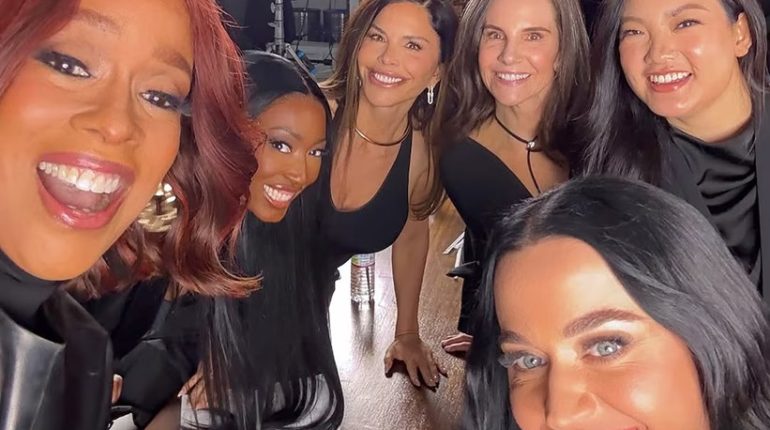After the “E.T.” singer returned to Earth following her 10-minute trip on Jeff Bezos’ Blue Origin spaceflight—which also included Gayle King and the tech billionaire’s fiancée Lauren Sánchez—she shared how her and Orlando Bloom’s 4-year-old daughter Daisy Dove is helping her adjust back to gravity.
“Back to the best reality,” Katy wrote in an April 16 Instagram Story, “packing school lunch.”
The photo included a glimpse into Daisy Dove’s schooltime meal, which included pineapple, cheese, carrots, pretzels and a star-shaped sandwich.
And while Katy is back to supporting her daughter, Daisy was, of course, there to support her mom during her momentous spaceflight April 14. Indeed, the preschooler was at the Texas launch April 14 with dad Orlando, beaming with pride as her mother headed up to space. Daisy even donned a silver astronaut costume for even more moral support.
Meanwhile, Katy brought a real daisy flower aboard the ship, telling a reporter that in addition to the token being representative of her only child, “They are a reminder of our beautiful Earth and the magic that is everywhere and all around us, even in a simple daisy.”
Katy wasn’t the only one receiving lots of love from her inner circle amid her big journey. Gayle, for her part, was supported by her own kids Kirby Bumpus and Will Bumpus, as well as her lifelong bestie Oprah Winfrey. The latter, who gushed over her nearly 50-year friendship with the CBS Mornings host, was moved to tears upon seeing the Blue Origin launch.
Post Views: 418
The diet industry thrives on making eating complicated, but sustainable weight management stems from simple, enjoyable habits. These subtle shifts - rooted in behavioral science and nutrition research - lead to gradual, lasting changes without deprivation or calorie counting.
Begin with mindful eating practices. Remove distractions during meals - no phones, TVs, or computers. It takes 20 minutes for satiety signals to reach your brain, so pace yourself by putting utensils down between bites. Use smaller plates (9-10 inches instead of 12) to trick your brain into feeling satisfied with appropriate portions. Chew each bite 15-20 times - this mechanical digestion aids nutrient absorption and prevents overeating.
Structure your plate using the "healthy half" principle. Fill 50% with non-starchy vegetables (broccoli, spinach, peppers), 25% with quality protein (salmon, chicken, tempeh), and 25% with fiber-rich carbs (quinoa, sweet potato, brown rice). This balance provides nutrients while naturally controlling calories. When snacking, combine protein with produce - apple slices with almond butter or cottage cheese with berries - to stabilize blood sugar.
Grocery store strategy prevents pantry pitfalls. Shop the perimeter first for fresh foods, and never grocery shop hungry. If unhealthy snacks enter your home, store them out of sight in opaque containers - studies show we're three times more likely to eat what's visible. Instead, keep washed fruit on counters and pre-cut veggies at eye level in the fridge.
Restaurant survival skills maintain progress. Preview menus online to make deliberate choices before arriving. Start meals with a broth-based soup or salad (dressing on the side) to take the edge off hunger. When ordering, request substitutions like extra vegetables instead of fries. For indulgent dishes, set aside half immediately in a to-go box - you'll enjoy the flavors without overdoing portions.
Hydration habits curb false hunger. Often we mistake thirst for hunger - try drinking 8oz of water when cravings hit, waiting 15 minutes before eating. Infuse water with cucumber, mint, or citrus for flavor without calories. Herbal teas like peppermint or ginger satisfy the desire for something flavorful while providing digestive benefits.
Sleep and stress management complete the picture. Chronic stress elevates cortisol, which promotes abdominal fat storage. Develop non-food stress relievers - a 10-minute walk, deep breathing, or calling a friend. Prioritize sleep hygiene by establishing a consistent bedtime routine - well-rested people make better food choices and have healthier hunger hormone levels.
These habit-based changes create a "non-diet diet" - a sustainable way of eating that becomes second nature. Over time, you'll naturally gravitate toward healthier options because they make you feel energized and vibrant. The weight loss that follows is simply a pleasant side effect of treating your body well.
